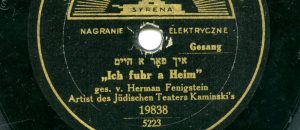Each month, Europeana Music invites a guest curator to talk about a musical subject and highlight some of the material on Europeana Music. For the month of October, Pekka Gronow presents the Harry Orvomaa collection of Jewish recordings. Now retired, Pekka was one of the founders of the Finnish Institute for Recorded Sound and adjunct professor of ethnomusicology at the University of Helsinki.
Detail of the recording "Ich fuhr a Heim" sung by Herman Fenigstein, recorded in Warsaw, 1929 (Finnish Institute of Recorded Sound).
Harry Orvomaa (1927 - 1990) was one of the most successful Finnish record producers of the 1960s and 1970s.
His passion for recorded music was fueled by an early interest in traditional jazz and, when he died, he left a large collection of historical 78rpm jazz records to Suomen äänitearkisto, the Finnish Institute for Recorded Sound.
As often happens with archives, the donation lay in storage for many years, until I started cataloguing it a few years ago. To my surprise I found out that the boxes also contained a considerable number of Jewish music on labels such as Syrena and Elesdisc.
This was a field of music where my knowledge was very limited, especially as many of the labels had texts in Yiddish / Hebrew characters. Fortunately I was able to draw on the expertise of specialists in Jewish music, in particular Michael Aylward, whose website Der yidisher gramofon is a priceless source of information on early Jewish recordings.
Harry Orvomaa’s family belonged to the small Jewish community in Finland, and his ancestors had come from the Lomza region in Poland. The collection contained, among others, a number of recordings made in Warsaw in the 1920s and 1930s. It was decided to form a separate collection of Harry Orvomaa’s Jewish 78s, and we were even able to add some new donations and exchanges to the collection.
Thanks to a grant from the Kone Foundation, the collection has now been digitised, and parts of it are accessible online on Europeana Music.
A considerable part of historical Jewish recordings consists of religious songs in Hebrew. A hundred years ago Jewish congregations in Europe and America competed for the best cantors, and famous cantors also became popular recording artists.
The cantor Joseph Rosenblatt, who made hundreds of records, was even billed as “the Jewish Caruso”, and listening to his recorded voice makes one believe that he would also have been a big star in opera, if he had chosen that path.
Another large part of the collection presents music from the Yiddish stage in Eastern Europe.
Before the Holocaust, Warsaw, Vilnius, Lvov, Bucharest and many other Eastern European cities had theatres presenting plays, revues and musical shows in Yiddish. Artists from these theatres also made numerous recordings.
They are extremely interesting for the history of European popular music, as many of the performers later on made the transition to the “mainstream” stage in German, English and other languages, and tunes from the Jewish theatre often got a new life with new lyrics. At that time, copyright was not as important as today.
As an example of the recordings in the Orvomaa collection I have chosen Ich fuhr a Heim (איך פאָר א הײם), I’m going home, recorded by Herman Fenigstein in Warsaw in 1929. Fenigstein made a number of recordings for the Syrena label.
Fenigstein was a member of the Jewish “literary-artistic troupe” Sambatiyon, founded in Vilnius in 1926. The group soon relocated to Warsaw, where they appeared until the end of 1929. On the label of the recording made in 1929, Fenigstein is already billed as an artist from Kaminski’s Jewish Theatre. This probably refers to the well-known theatrical company organized by the actress Ida Kaminska.
I have not able to find more information on the artist. In cataloguing the Orvomaa collection, I discovered that I had stumbled on one of the white spots on the map of discography. Most countries today have a national sound archive, and at least some discographies or literature on recorded history, but there does not seem to be any archive in Europe that systematically documents and collects Jewish recordings before the Holocaust. However, websites such as Europeana, which bring together documents from many sources, will hopefully one day create a virtual archive of all European recordings.

